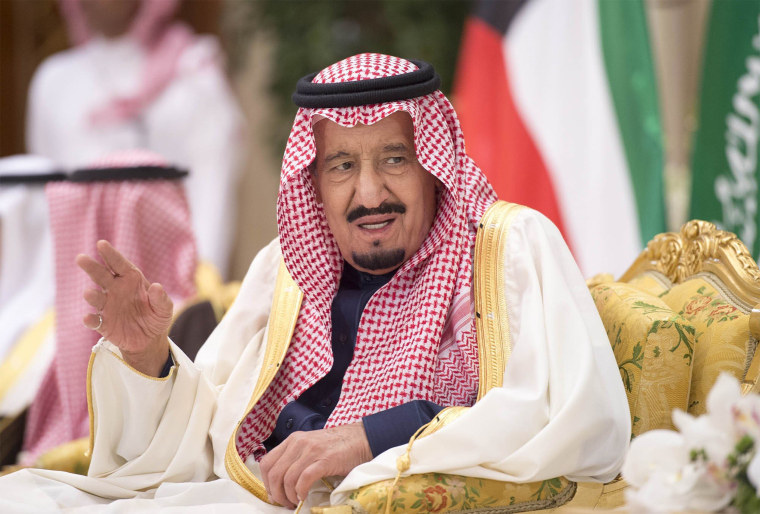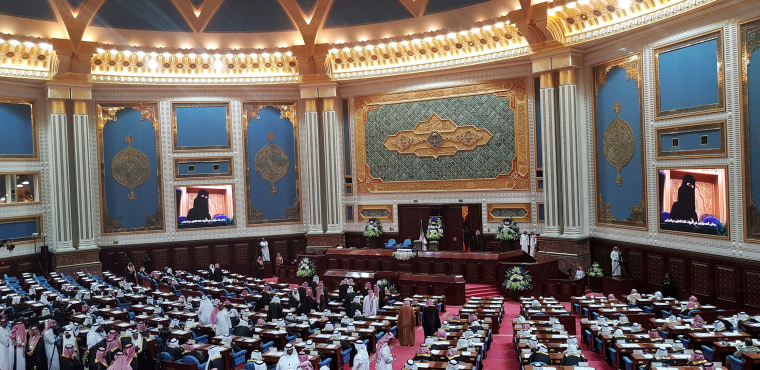You could be forgiven for thinking that it was business as usual in the Saudi capital on Monday during King Salman's annual speech to the country's Shura Council.
Just days after Saudi Arabia's top prosecutor recommended the death penalty for five suspects in the murder of Washington Post contributor Jamal Khashoggi, the king did not mention the firestorm of controversy swirling around his country. The CIA believes the king's son, Crown Prince Mohammed bin Salman, ordered the killing.

King Salman did voice support for the kingdom's judiciary, which will be handling the investigation into Khashoggi's Oct. 2 killing in the Saudi Consulate in Istanbul.
“The kingdom was founded on an Islamic approach based on the establishment of justice, and we take pride in the efforts of the judiciary and the public prosecution in the fulfilling the duty entrusted to them, and we affirm that this country will not deviate from the application of God's law,” he said during the speech to the unelected body that advises the absolute monarch.
After initially vehemently denying any official involvement in the killing, the Saudis claimed Khashoggi — a former insider who became a prominent critic of Prince Mohammed — was killed by a team of rogue operatives.
A series of official leaks have linked the prince to the killing, but the young royal has remained officially untouched by the kingdom's investigation.
On Friday, NBC News reported that the CIA had concluded that Prince Mohammed ordered the killing, according to a person briefed on the assessment. NBC News had previously reported that the U.S. intelligence community believes it's unlikely that Prince Mohammed could have had no connection to Khashoggi's death.
Asked if the CIA had assessed whether the crown prince was behind the killing, President Donald Trump said on Sunday, "They have not assessed anything yet. It's too early. That was a very premature report."
During the speech, the king reiterated his support for his son's signature initiative to turn around around the oil-dependent economy and cut unemployment.
“Our country is undergoing a comprehensive developmental plan in accordance with the plans and programs of the kingdom’s Vision 2030, which is proceeding in parallel and achieving its goals at satisfactory rates,” he said. “You are aware of the efforts of the state to create more job opportunities and we directed the crown prince, the president of the Economic Development Affairs Council, to concentrate and develop the human capabilities and prepare the new generation for future jobs.”
After first becoming an international figure in 2015 upon being named deputy crown prince, Prince Mohammed was praised for weakening the country’s powerful conservative clerics and increasing women’s participation in the economy and society — including granting them the right to drive.
More recent efforts to silence dissent and a harsh crackdown on fellow princes, business leaders, rights defenders, women’s activists and reforming clerics has raised the alarm, however. The brief kidnapping of Lebanese Prime Minister Saad Hariri and break with fellow Gulf kingdom Qatar have also worried traditional allies, including in the United States.
The king also defended another initiative spearheaded by his 33-year-old son: The disastrous war in neighboring Yemen. The conflict in the desperately poor country has helped created the world’s worst humanitarian disaster and pushed half of the population, or some 14 million people, to the brink of starvation.
While Khashoggi killing crystallized much of the growing international unease with Saudi Arabia, the kingdom as well as Prince Mohammed have become linchpins in the Trump administration’s plans, like containing Iran’s regional ambitions and delivering an Palestinian-Israeli peace plan.
In May 2017 during Trump’s first visit abroad as U.S. leader, the president announced $110 billion in immediate sales of U.S. arms and equipment, with $350 billion in additional deals over the next 10 years.
While it is unclear how much of Trump's announcement covered deals that had already been unveiled, the president has touted such arms sales in an effort to explain the importance of the relationship with the kingdom.
Recently, bipartisan pressure has also been mounting on Trump to distance the U.S. from Saudi Arabia and in particular the crown prince. Sen. Lindsey Graham, a close Trump ally, on Sunday harshly condemned the crown prince over the young royal’s alleged role in Khashoggi’s killing, calling the country’s de facto ruler "unhinged."
"The fact that he didn’t know about it is impossible for me to believe," Graham said on Sunday's "Meet The Press." The Republican said he hasn’t been given an official briefing on the matter, but maintained that the conclusion that the crown prince had a role in Khashoggi's murder should be clear to anyone with knowledge about the country.
“If he is going to be the face of Saudi Arabia going forward, I think the kingdom will have a hard time on the world stage,” Graham said.
On Thursday, the United States announced sanctions against 17 Saudi Arabian officials in response to the killing.


